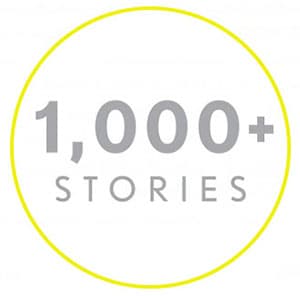
Theresa Carrington knows what it is to grow up living in poverty. She also knows there are many issues with true Fair Trade labelling, resulting in the unfair treatment of artisans on the ground in third world countries. So she set out to solve both. For over a decade, this Saint Louis, Mo., native has been working to create a poverty-free world by igniting the entrepreneurial spirit of people through her company Ten by Three. Through her Artisan&You technology, she seeks to ensure artisans are treated and paid fairly for their work, in turn helping to lift them out of poverty.
Theresa Carrington’s story, as told to The Story Exchange 1,000+ Stories Project:
The idea of Ten by Three (formerly The Blessing Basket Project) was born in the year 2002 when I was facing conflict in my own personal life. I was motivated by the incredible support provided by my friends and family. They sent me notes, cards and pictures for encouragement, which I kept in my own blessing basket. I would read these letters for encouragement in times of distress. My purpose truly began with Ten by Three, an endeavor to pay forward what other people have invested in my life. I strongly believe that every individual is proficient in altering the world in their own tiny ways, if only they are able to recognize where their purpose in life begins. To motivate and inspire other women, I began speaking at conferences and organizations telling my Blessing Basket story.
My definition of success is daily authenticity. When I am consistently authentic, I am more peaceful inside and am more powerful in my daily work. My biggest success in terms of my work is those who have graduated out of poverty and can stand independently on their own two feet. I have had the privilege of changing the lives of thousands of people in this way — and each life changed is a huge success to me.
Growth and efficiency are our two main business goals. Demand for our baskets have outpaced our current production. This presents us with an opportunity to expand operations. Our expansion goal is to expand to 10 new developing countries in the next 5 years, starting in June 2018. We want to improve the efficiency of our existing technology in order to increase our productivity. We plan to create technology and communication kits enabling us to extend our reach and improve our project efficiencies in ways our current funding prevents.
“My biggest success in terms of my work is those who have graduated out of poverty and can stand independently on their own two feet.”
– Theresa Carrington, Founder of Ten by Three
One of our top challenges is how consumers are being tricked by the term “fair trade” in developing countries. I have witnessed the ground reality where baskets are being supplied to organizations in the United States marketed as fairly traded. Yet I knew the truth on the ground. Faced with an ethical dilemma of what to do, I solved it by inventing uncomfortable levels of transparency for those doing poverty eradication work. The Blessing Basket Project created Artisan&You technology, which is changing consumers expectations when it comes to handcrafted goods. Before this consumers just had to trust the fair trade marketing material they were seeing at the point of sale. Our technology empowers us to put the face of each artisan on every good they make. The consumer is connected to that artisan through the Artisan&You platform. No longer do consumers have to trust what they are being told, they can actually check the facts.
On a personal level, I was born an orphan and adopted when I was 8 years old. I was raised in poverty in the United States. It perfectly prepared me for the work I do today, which is to help women in developing countries sustainably exit poverty through entrepreneurship. I don’t know what it’s like to be poor in a developing country, but I do know what it’s like to be poor in my country. I know what it feels like to have a specially colored lunch card, which represented government assistance for food. I know what it’s like to be looked at differently because of the way I dressed and where I lived. I also know what it feels like when someone, anyone, saw value in me and empowered me to rise through my own strengths. It is these thoughts, these experiences that empower my business decisions. They inspire me to innovate to empower women around the world. My mission is to empower women sustainability by fueling their strength.
My role model is my African Grandmother, Asampanah. She lived nearly her entire life in the village of Nyariga in the extreme upper east region of Ghana. She adopted me after seeing my dedication over several years to serving the lives of those in her village. If you had met her you would have never known that she faced poverty so extreme that she was forced to live inside a tree. Poverty forced her to live, with her young children in a TREE for three rainy seasons. And yet, in the middle of this extreme poverty she found humor. She spoke with me about it before she died, and she told me about a time the rains were beating down and, with the family huddled inside, the tree began leaking. She looked at her husband and said, “It’s time to fix the roof dear.” She said he had no humor about it, but she thought it was hilarious. She patched the hole with clay. Among many important lessons, Asampanah taught me that humor lights the way out of some of life’s darkest tunnels.
[box_light]Website www.tenbythree.org
Facebook www.facebook.com/blessingbasket
Twitter @tenbythreee
Instagram @TheBlessingBasketProject[/box_light]


